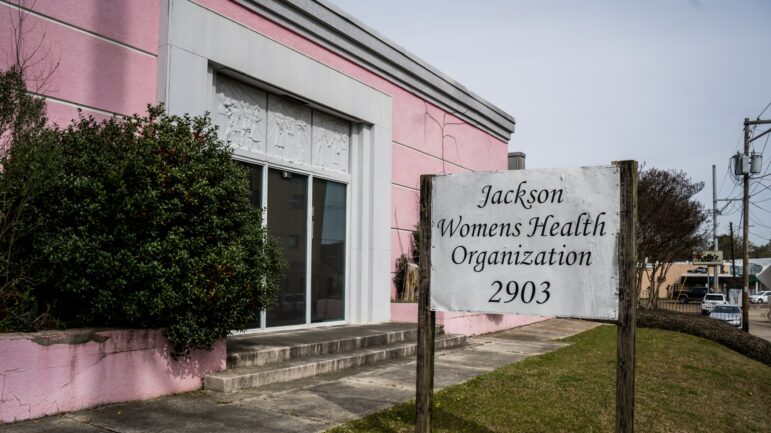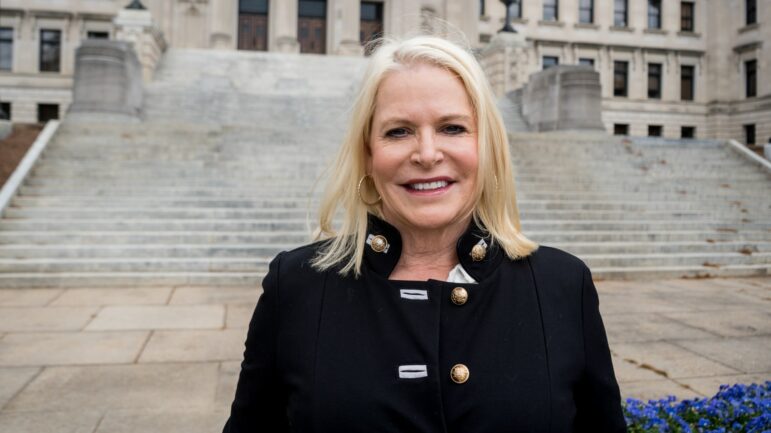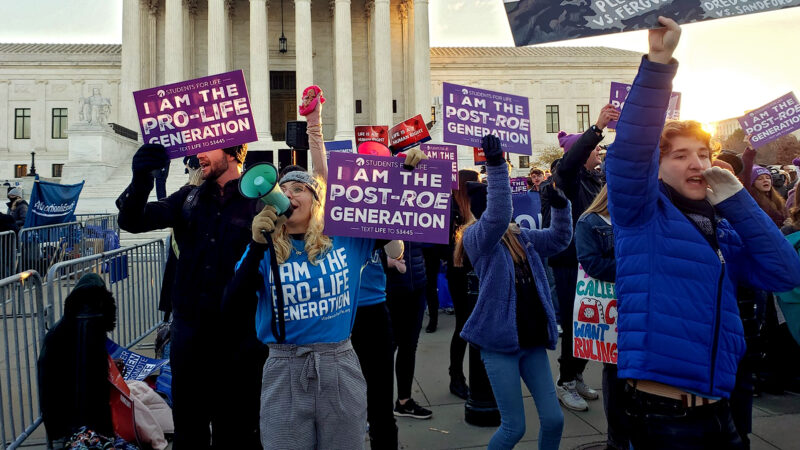What to know about Alabama abortion rights after SCOTUS overturns Roe v. Wade
Anti-abortion advocates hold up signs reading “I am the pro-life generation” and “I am the post-Roe generation” outside of the U.S. Supreme Court ahead of the court’s hearing of Dobbs v. Jackson Women’s Health Organization, Dec. 1, 2021. Hundreds of demonstrators from both sides of the abortion issue rallied outside the court.
The U.S. Supreme Court has voted to overturn the landmark Roe v. Wade case in its decision to uphold Mississippi’s 15-week abortion ban, according to its ruling in Dobbs v. Jackson Women’s Health Organization released Friday.
The 6-3 ruling was written by Associate Justice Samuel Alito, joined by Associate Justices Amy Coney Barrett, Neil Gorsuch and Clarence Thomas. Thomas and Associate Justice Brett Kavanaugh filed concurring opinions in the decision. All five are Republican-appointed justices.
Chief Justice John Roberts also filed a concurring opinion.
“The Constitution does not confer a right to abortion; Roe and Casey are overruled; and the authority to regulate abortion is returned to the people and their elected representatives,” the ruling read.
Democrat-appointed Associate Justices Stephen Breyer, Sonia Sotomayor and Elena Kagan all filed a dissenting opinion.
“With sorrow—for this Court, but more, for the many millions of American women who have today lost a fundamental constitutional protection—we dissent,” they wrote.”
RELATED: Read the opinion here.
The ruling opens the door for U.S. states to ban or heavily restrict abortions immediately or in the near future, including in the Gulf South. Here are answers to some frequently asked questions about abortion laws in our region:
Is abortion illegal everywhere now?
No. By overturning Roe v. Wade, abortion is not outlawed, but the laws governing it are now left up to individual states. This allows states to enact complete bans or any other law they see fit regulating abortion.
Twenty-six U.S. states are certain or likely to move quickly to ban or heavily restrict abortion rights, according to the Guttmacher Institute. Of those 26 states, 13 have trigger bans that will go into effect immediately or by quick state action once Roe v. Wade is overturned.
What abortion laws are in place in the Gulf South states?
Most abortions are or will soon be banned across the Gulf South now that Roe v. Wade has been overturned. Here’s the legal landscape for each state:
Alabama: In May 2019, Gov. Kay Ivey signed a bill into law that banned nearly all abortions at any stage of a pregnancy, unless a woman's life is threatened or there is a lethal fetal anomaly. The ban, however, was blocked by a federal judge. With Roe overturned, though, state officials say they would move quickly to challenge the federal judge’s ruling.
Currently, Alabama does not allow abortion past the 20th week of gestation unless a doctor has determined either that the fetus is unviable or that carrying the fetus to term would cause death or severe and irreversible impairment to the woman.
The state also has a pre-Roe ban on abortion that was never repealed. State lawmakers have also passed an amendment to the state constitution that recognizes the rights of the unborn. Some believe this amendment could open the door to outlaw abortion completely now that Roe v. Wade has been overturned.
Louisiana: Louisiana’s three abortion clinics have stopped providing the procedure as of Friday, following the U.S. Supreme Court decision in the Dobbs v. Jackson Women’s Health Organization case that overturned Roe. v Wade.
On Tuesday, Gov. John Bel Edwards signed Senate Bill 342 into law, which updated the law to include exceptions for medically futile and ectopic pregnancies. No exceptions for victims of rape or incest are included. The new bill also stiffens the criminal penalties for abortion providers already outlined in state law, doubling the maximum sentences to 10 and 15 years, depending on when an abortion is performed during a pregnancy.
Mississippi: Mississippi also has a trigger law in place, but unlike Louisiana, it will require certification from state Attorney General Lynn Fitch before going into effect — one of seven states in this situation.
Under the law, abortion is banned, unless a pregnant person’s life is in danger or the pregnant person is a victim of rape and has reported the incident to law enforcement. Anyone who performs or attempts to perform an abortion will be charged with a felony punishable by a fine of up to $100,000, up to 10 years in prison, or both, according to the Guttmacher Institute.

Do abortion clinics in the Gulf South states have to close?
Alabama: There are three clinics that perform abortions in the state. Two of them stopped providing abortions on Friday, according to AL.com. The state could now seek to enforce its 2019 law banning nearly all abortions, and force the state’s clinics to stop performing abortions.
Louisiana: There are three clinics that perform abortions in the state. The newest anti-abortion law directs the clinics to cease providing abortions immediately now that Roe is overturned.
Mississippi: Jackson Women’s Health Organization is the last clinic in the state that performs abortions. The clinic might try to stay open in the days after the decision, during the 10 days before Mississippi’s trigger law is set to take effect. Once the law is in effect, Jackson Women’s Health Organization will be forced to stop providing abortions.

How did we get to this ruling?
The Dobbs v. Jackson Women’s Health Organization lawsuit stems from a 2018 Mississippi bill, signed into law by Gov. Phil Bryant, that bans nearly all abortions in the state after 15 weeks. Initially, the state argued that the 15-week abortion ban is a regulation that doesn't end a woman's right to obtain the procedure.
The law only allows abortion in pregnancies where the fetus has health problems that make it “incompatible with life” outside of the womb at full term, or if the pregnancy threatens a pregnant woman’s life or a major bodily function. Pregnancies caused by rape and incest are not exempt.
Within an hour of signing the bill into law, Jackson Women’s Health Organization sued the state, claiming the bill was blatantly unconstitutional. In response, the state asked the Supreme Court not only to uphold its abortion ban but to overrule Roe and find there is no constitutional right to abortion.
I was proud to sign House Bill 1510 this afternoon. I am committed to making Mississippi the safest place in America for an unborn child, and this bill will help us achieve that goal. pic.twitter.com/O0O4QeILLx
— Phil Bryant (@PhilBryantMS) March 19, 2018
However, the buildup to that bill was decades in the making. WWNO and WRKF public health reporter Rosemary Westwood’s “Banned” podcast highlights how the work of activists and politicians helped chip away at abortion rights over the past two decades.
Episode one of the podcast highlights how activist Terri Herring played a role in passing other various restrictions on abortion rights — ranging from children needing both parents’ permission to receive an abortion, to a required 24-hour waiting period between first coming into a clinic and being able to get an abortion.
In episode four, Westwood speaks with Mississippi lobbyist Jameson Taylor about the strategy behind the bill. Taylor compares it to a football team coming up with a book of plays and trying everything they can to win. Essentially, there was no designed plan for this bill to be the one that overturned Roe. It was simply the one attempt, out of many, that stuck.
Timing also played a role. Former President Donald Trump was able to appoint three of the current justices on the Supreme Court during his term; Gorsuch in 2017, Kavanaugh in 2018 and Barrett in 2020.
This story was produced by the Gulf States Newsroom, a collaboration among Mississippi Public Broadcasting, WBHM in Alabama and WWNO and WRKF in Louisiana and NPR.
Trump says he is ‘not happy’ with the Iran nuclear talks but indicates he’ll give them more time
U.S. President Donald Trump said Friday he's "not happy" with the latest talks over Iran's nuclear program but indicated he would give negotiators more time to reach a deal to avert another war in the Middle East.
Bill Clinton says he ‘did nothing wrong’ with Epstein as he faced grilling over their relationship
Former President Bill Clinton told members of Congress on Friday that he "did nothing wrong" in his relationship with Jeffrey Epstein and saw no signs of Epstein's sexual abuse as he faced hours of grilling from lawmakers over his connections to the disgraced financier from more than two decades ago.
Pentagon puts Scouts ‘on notice’ over DEI and girl-centered policies
After threatening to sever ties with the organization formerly known as the Boy Scouts, Defense Secretary Hegseth announced a 6-month reprieve
President Trump bans Anthropic from use in government systems
Trump called the AI lab a "RADICAL LEFT, WOKE COMPANY" in a social media post. The Pentagon also ordered all military contractors to stop doing business with Anthropic.
HUD proposes time limits and work requirements for rental aid
The rule would allow housing agencies and landlords to impose such requirements "to encourage self-sufficiency." Critics say most who can work already do, but their wages are low.
Paramount and Warner Bros’ deal is about merging studios, and a whole lot more
The nearly $111 billion marriage would unite Paramount and Warner film studios, streamers and television properties — including CNN — under the control of the wealthy Ellison family.







